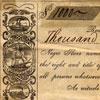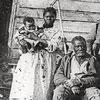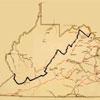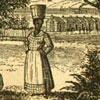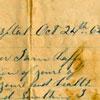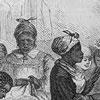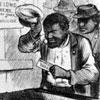Immediate reactions to John Brown’s raid on Harpers Ferry varied. Southerners vilified him, but not always for the same reasons. To some southerners, Brown’s behavior was that of an aberrant lunatic; to others, his fanatic and violent reaction to the “peculiar institution” was typical of what they imagined to be northern popular opinion. A handful of southerners evinced grudging respect for Brown’s courage and the strength of his convictions even as they despised his cause.
This excerpt, from a newspaper editorial in the Richmond (VA) Enquirer immediately following the raid on Harpers Ferry captured the general opinion of many southern whites. It suggested that Harpers Ferry brought the nation closer to “Disunion” and that the North should condemn Brown’s actions in order to repair the rift. It further called for northerners to vote against Republicans in the next election, a call that went unanswered.
"The Harper’s Ferry Invasion as Party Capital," Richmond, Virginia, Enquirer [Democratic] October 25, 1859
… The Harper’s Ferry invasion has advanced the cause of Disunion, more than any other event that has happened since the formation of the Government; it has rallied to that standard men who formerly looked upon it with horror; it has revived, with ten fold strength the desire of a Southern Confederacy. The, heretofore, most determined friends of the Union may now be heard saying, “if under the form of a Confederacy, our peace is disturbed, our State invaded, its peaceful citizens cruelly murdered, and all the horrors of servile war forced upon us, by those who should be our warmest friends; if the form of a Confederacy is observed, but its spirit violated, and the people of the North sustain the outrage, then let disunion come.”
The people of New York have the opportunity, at the approaching election, not only of rebuking Mr. Seward, the great leader of the Ossawattomite Republicans, but of showing the people of the South, that the sympathy of the great State of New York is with Virginia and not with the traitor that must meet the just punishment of his treason.
Responses in the North were even more varied. Some northerners lionized John Brown. Among abolitionists in particular, his uncompromising strike against slavery lent him the aura of a saint. Other northerners, particularly those in the new Republican Party, sought to distance themselves from Brown, viewing his attack on Federal property as a dangerous prelude to insurrection and his demands for an immediate end to slavery a significant political liability to their young party.
Northern attitudes towards Brown and his raid, however, changed over time. By the middle of the war, Brown’s prediction that the national crime of slavery could be purged only “with Blood” seemed less the ranting of a madman and more the prophecy of a visionary.
Source: “The Harper’s Ferry Invasion as Party Capital,” Enquirer (Richmond, VA, October 25, 1859), Secession Era Editorials Project, by Lloyd Benson, Furman University, accessed September 20, 2011.


